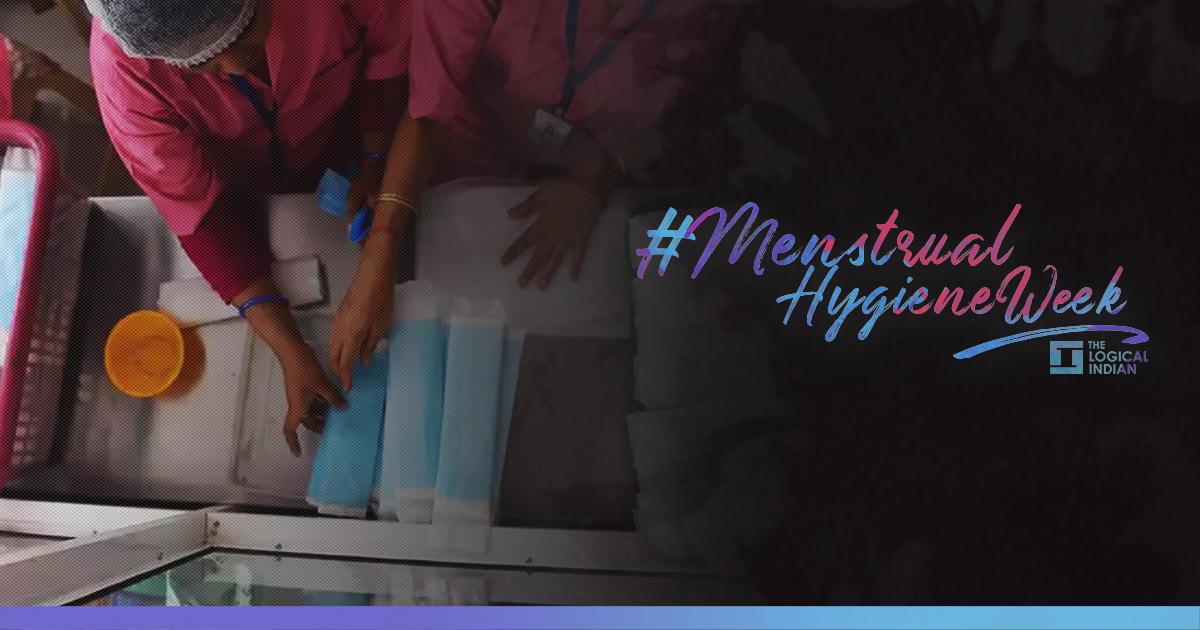As World Menstruation day approaches us on May 28th, the topic may be out in the open but the stigma remains in the society as a whole. #MenstrualHygieneWeek is a campaign by The Logical Indian to create awareness, ask pertinent questions, get answers and bust myths.
According to the National Family Health Survey (NFHS) 2015-16 report, about 48 per cent of women – aged between 15-24 – in rural areas and 78 per cent in urban areas use sanitary napkins during the menstrual cycle.
While it is appreciable that women are slowly moving towards hygienic menstrual products, at the same time the side effects of using sanitary napkins cannot be ignored.
Talking to The Logical Indian, co-founder of Boondh – an NGO working towards creating ‘sustainably menstruating population’, Sonal Jain said, “Pads are made of innumerable chemicals including banned carcinogenic herbicides which get absorbed through our skin and can lead to several diseases like RTIs, STIs, cervical cancer.”
“It (sanitary napkin) has absorbent gel, which absorbs all the moisture in our body and leaves our body dry and irritating,” adds Sonal.
Environmental impact
Sanitary napkins are also detrimental to nature when it comes to disposal. As sanitary napkins are mostly made up of plastic, it takes more than 600 years to decompose.
Apart from the product used in its manufacturing, napkins contaminated with blood are a biological hazard and pose great health risks for the waste collector.
According to the Bio-Medical Waste (Management and Handling) Rules, 1998, items contaminated with blood and body fluids, including cotton, dressings are a bio-medical waste and should be incinerated and autoclaved to destroy pathogens.
“Most alarming is that there is no proper mechanism for disposing of these pads. They are either flushed down the toilet or tossed away. Ideally, these pads should go to the incinerator. In India that happens rarely as we do not have incinerator that needs to be of world health organisation standard. In India, we still have incinerator which is only around 400-500 degree Celsius, while as per WHO standards, it should be 800-degree Celsius,” says Boondh co-founder. “When we toss these pads contaminated with blood away, other waste management workers expose themselves to hazards, who come in contact with it.”
Talking about the waste generated by the disposal of sanitary napkins, Sonal says, “In a lifetime, any person who uses sanitary napkin releases about 120-150 kgs of blood, which is a biological hazard. So, if one woman is creating so much waste, then one can imagine all the waste generated by all the menstruating women.”
Alternative to Sanitary Napkin
“Because of many demerits of commercially sold napkins, we are putting more efforts on cloth pads, which are made of 100 per cent cotton,” told S. Damodaran, founder of Gramalaya, an NGO which works towards educating people in menstrual hygiene management, to The Logical Indian.
“Cloth pads are eco-friendly as well as female friendly. The pads can be reused up to three years with proper care. Commercial sanitary napkins are non-biodegradable and thus harmful to the environment,” he added.
As part of an initiative for educating women in rural areas to stop the traditional way of using cloth during the menstruation period, Gramalaya has selected 200 hundred schools across Tamil Nadu for educating people about menstrual hygiene among girls and promoting reusable cloth pads. According to the NFHS data, about 62 per cent of women aged between 12-24 still use clothes, along with other methods, during menstruation.
Similarly, Boondh NGO promotes usage of menstrual cups instead of sanitary napkins. Menstrual cups are made of medical grade silicone that is inert and do not affect the vaginal environment nor does the vagina affect the composition of the cup. And cups, unlike sanitary napkins, produce zero waste as it is made of silicone, which is recyclable. “We are also ditching all plastic that goes into packaging, delivery and disposal of sanitary pads that is a recurring process,” says Sonal.
“With better outreach and education on sustainable menstrual products it is possible to improve the situation, particularly because there are no recurring costs in reusable products like cups and ancillary products required to manage periods,” she adds.
What does menstruation mean to you? Do you twitch a bit or sit uncomfortably at the mere mention? Want to share your experience? write to us at [email protected], remember to hashtag #MenstrualHygieneWeek











